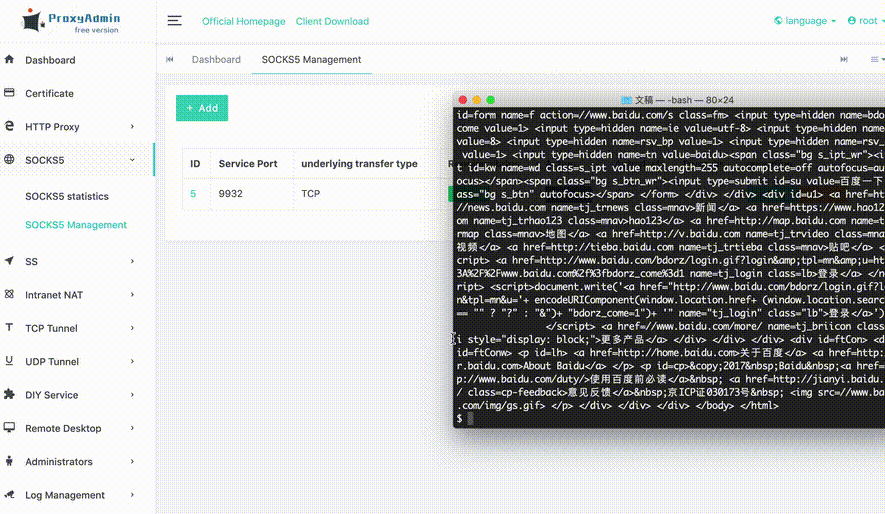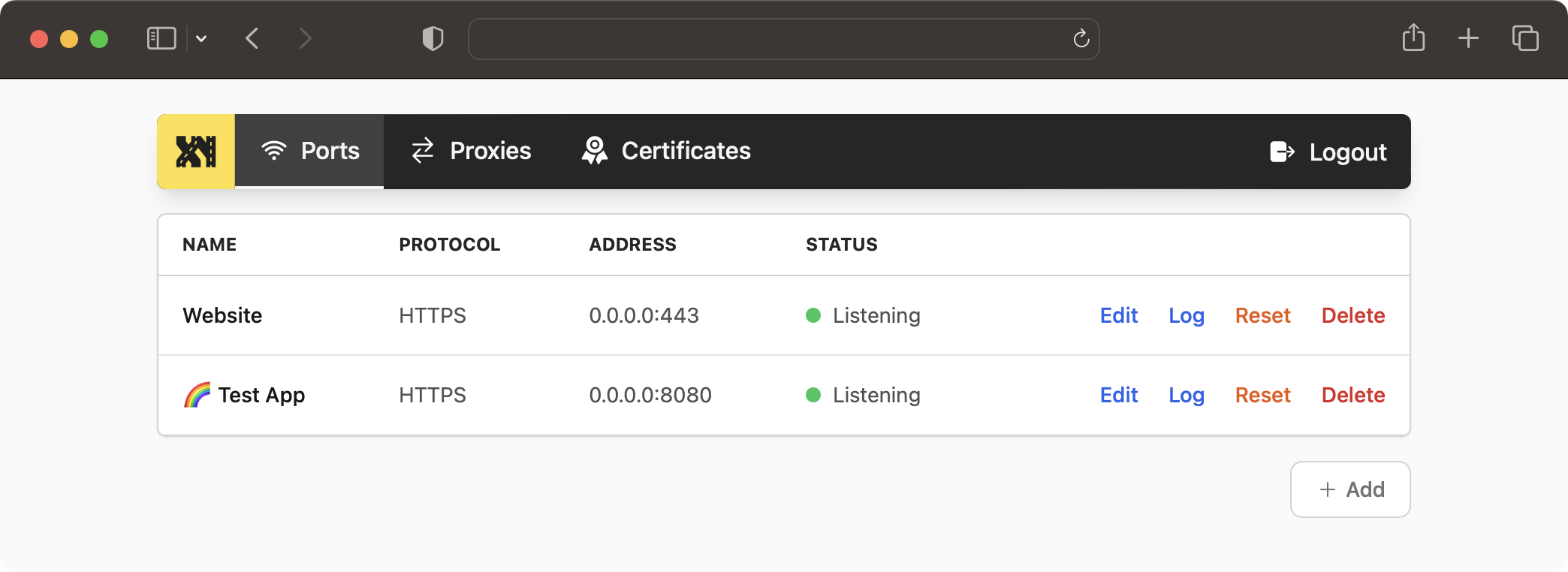20 Open-Source Free Proxy Server Apps to Take Control of Your Network / Internet Traffic
Table of Content
Imagine you're at a fancy restaurant. You don't talk directly to the chefs in the kitchen, right?
Instead, there's a waiter who takes your order, delivers it to the kitchen, and brings back your food. That waiter is like a reverse proxy in the world of web servers.
What Does a Reverse Proxy Do?
A reverse proxy is like a super-smart middleman between you (the hungry customer) and the web servers (the busy kitchen). Here's how it works:
- You ask for a website (place an order).
- The reverse proxy takes your request (like a waiter).
- It decides which server should handle it (chooses the right chef).
- The server does its thing (cooks your meal).
- The reverse proxy delivers the result back to you (serves your food).
Why Bother with a Reverse Proxy?
- Load Balancing: It spreads requests across multiple servers, so no single server gets overwhelmed. It's like having multiple chefs to handle a busy night at the restaurant.
- Security: It acts as a bouncer, keeping the bad guys away from your actual servers. Your servers get to work in peace, like chefs in a secure kitchen. It can also filter, block, or modify requests to mitigate malicious traffic.
- Caching: It can remember popular content and serve it quickly, like a waiter who knows the daily specials by heart.
- Simplicity for Users: You just go to one address, and the reverse proxy figures out the rest. It's like having one phone number for a restaurant chain instead of calling each location separately.
- Traffic Monitoring and Logging: Monitors incoming requests, logs traffic data, and provides insights for troubleshooting or performance optimization.
- SSL Termination: A Reverse proxy server enables you to manages SSL/TLS encryption by decrypting requests at the proxy level, reducing the load on backend servers.
So next time you visit a website, remember there might be a hardworking reverse proxy making sure your digital dining experience is smooth and secure!
Use-Cases of a Proxy Server
- Anonymity: Hides user identity by masking IP addresses, useful for privacy.
- Content Filtering: Schools, businesses, or organizations use it to block or allow specific websites.
- Improved Security: Protects against malicious websites by filtering harmful content before it reaches the user.
- Accessing Geo-Restricted Content: Allows users to bypass regional restrictions on content.
- Caching: Speeds up browsing by caching frequently visited websites, reducing bandwidth usage.
Who Uses Proxy Servers:
- Businesses: For controlling employee internet usage, improving security, and managing bandwidth.
- Individuals: For privacy, bypassing geo-restrictions, or enhancing online security.
- Schools and Universities: To filter content and restrict access to inappropriate websites.
- Data Scrapers and Researchers: To gather information without revealing their identity.
Looking for SSH or Web Tunneling Service?
If you are looking for an open-source tunneling server similar to Ngrok,we got you covered here.

In the following you will find the best open-source reverse proxy servers, for Linux, Windows and macOS.
1- 3proxy
This is a fast lightweight free proxy server that is written in pure C and comes with dozens of useful features that makes it useable for professional DevOps, Webmasters, and system engineers.
This tiny app works on almost all the platforms Unix, Linux, Solaris, macOS, Windows, iPhone OS, 32/64-bit versions for modern systems.
This feature-packed proxy solution is ideal for versatile use across various platforms and environments.
Features
- Parent Proxy Support: Username/password authentication, chain building (multihop), load balancing.
- Logging: Supports stdout, file, syslog, ODBC, RADIUS, custom log formats, log file rotation.
- Access Control: ACL-driven by user, IP, protocol, traffic limits (daily/weekly/monthly), bandwidth control, encrypted passwords.
- IPv6 & Proxy Support: IPv4/IPv6, HTTP/1.1, HTTPS (CONNECT), FTP over HTTP, transparent proxy.
- DNS Support: DNS caching, proxy, TCP redirection.
- SOCKS & Proxies: SOCKSv4/4.5, SOCKSv5 with UDP/BIND, POP3, FTP, SMTP proxies, TCP/UDP port mapping.
- Web Administration: Admin interface, stats, plugin extensions.
- Proxy Chaining: Bridge between client and proxy types (e.g., HTTP to SOCKS), connect-back proxy.
- Extensions: Regular expression filtering, SSL/TLS decryption, Windows authentication.
- Configuration: Supports config files, daemon mode, interface binding, auto-reload on changes.
2- Simple Proxy
Simple Proxy is a simple HTTP/HTTPS proxy - designed to be distributed as a self-contained binary that can be dropped in anywhere and run.
It works on Windows, Linux and macOS.
Simple Proxy's Features
- HTTP and HTTPS.
- Can choose which port to run on.
- Can specify paths to certificate and private key file to use.
- Logs each proxied connection.
- Log options can be supplied using
glog.- Can choose the log verbosity with the
-vflag. - Can choose to log to a file.
- Can choose the log verbosity with the
- Basic authentication.
- Can log request headers.
- Can log failed authentication attempt details.
- Printing version number.
3- Python Proxy
Python-proxy is a lightweight, open-source HTTP proxy written in Python. It's designed for simplicity and ease of use, allowing users to intercept and forward HTTP/HTTPS traffic. The project supports various proxy features like basic authentication, tunneling, and custom handling of requests and responses.
It is ideal for developers who need a straightforward proxy solution for debugging, testing, or traffic manipulation in Python-based applications.
Developers can easily install it using Docker.
4- GoProxy (Recommended)
GoProxy is a robust, open-source reverse proxy server and load balancer written in Golang. It offers advanced traffic management capabilities, including load balancing algorithms, caching, and traffic filtering.
GoProxy is versatile, supporting multiple protocols such as HTTP/HTTPS, SOCKS5, and TCP, making it suitable for a wide range of use cases, from simple traffic routing to complex load balancing across backend servers.

GoProxy comes with another open-source project a ProxyAdmin which is a self-hosted web-based app that enables you to manage your reverse proxy effectively.
5- Sōzu
Sōzu is a lightweight, fast, always-up reverse proxy server.
Sozu Features
- Hot configurable: Sōzu can receive configuration changes at runtime, through secure unix sockets, without having to reload.
- Upgrades without restarting: Sōzu is always-up, meaning it upgrades itself while still processing requests.
- Handles SSL: Sōzu works as a TLS endpoint, so your backend servers can focus on what they do best.
- Protects your network: Sōzu protect backends by shielding them behind the reverse proxy, limiting direct network access. Sōzu uses Rust, a language primed for memory safety. And even if a worker is exploited, Sōzu workers are sandboxed.
- Optimize performance: Sōzu makes the most of Rust's capacity to avoid useless copying and memory usage. Two key dependencies have been optimized in this way:
6- neosocksd
neosocksd is a fast and lightweight proxy server that can run Lua script as rule set.
Features
- Supported protocols: SOCKS4, SOCKS4A, SOCKS5 (TCP only), HTTP CONNECT, transparent proxy (Linux).
- High performance: transfer over 10 Gbps per x86 core on Linux. (with
--pipe, 2024) - Tiny: the executable is around 500 KiB on most platforms.
- Flexible: Lua scripts powered rule set.
- Versatile: RPC facilities for scripting, see scripting.
- Hot reloadable: RESTful API for monitoring and updating Lua modules.
- Morden: full IPv6 support & horizontally scalable.
- Conforming to: ISO C11, POSIX.1-2008. Additional features may be available on certain platforms.
7- Proksi
Proksi is a simple, lightweight, and easy-to-use proxy server that automatically handles SSL, HTTP, and DNS traffic. It is designed to be used as a standalone proxy server or as a component in a larger system. Proksi is written in Rust and uses Pingora as its core networking library.
8- Merino
Merino is a SOCKS5 Proxy server written in Rust.
Features
- Written in 100% Safe Rust
- Multi-threaded connection handler
- Lightweight (Less than 0.6% CPU usage while surfing the web/streaming YouTube)
- Standalone binary (no system dependencies)
1+ Gb/secondconnection speeds (On Gigabit LAN network over ethernet. Results may vary!)- Tunable logging (by flags or
RUST_LOGenvironmental variable) SOCKS5Compatible Authentication methods:NoAuth- Username & Password
GSSAPIComing Soon!
9- Froxy
Froxy is a cross-platform command line utility for implementing a forward (classic) and reverse proxy server based on .NET. It supports forwarding of any HTTPS traffic (CONNECT requests) for forward proxying and TCP, UDP or HTTP/HTTPS protocols for reverse proxying.
For web traffic redirection, GET and POST requests are supported with headers and body of the request passed from the client, which allows using REST API requests and authorization on sites.
It is an idea for Windows and Linux systems, SSH tunneling, and can be easily installed using Docker.
10- rpxy
This is a simple and ultrafast http reverse proxy serving multiple domain names and terminating TLS for http/1.1, 2 and 3, written in Rust
11- Bubble
Bubble is a free and open-source Rust-based versatile proxy server that supports SOCKS5, HTTP, and HTTPS protocols, providing fast, efficient, and secure Internet access.
12- FortifyNet Proxy
FortifyNet Proxy is a lightweight Rust proxy server designed to provide secure and efficient handling of HTTP requests with basic authentication and resource caching capabilities.
- Graceful Shutdown: Ensures data integrity and a smooth user experience during server shutdown.
- Activity Logging: Logs server activities for effective monitoring and troubleshooting.
- Proxy Authentication: Securely verifies user credentials before granting access to resources.
- Caching: Stores responses to repeated requests, reducing load on target servers and improving response times.
- HTTP Request Forwarding: Routes incoming HTTP requests to the appropriate target servers and relays responses back to clients.
13- Shoes
Shoes supports many protocol and comes with fancy features.
Shoes Features
- TLS support with SNI based forwarding
- Websocket obfs (Shadowsocks SIP003)
- Upstream proxy support: route connections through other proxy servers
- Forwarding rules: Redirect or block connections based on target IP or hostname
- Hot reloading: Updated configs are automatically reloaded
- Netmask and proxy groups
Shoes Supported Protocols, Modes, and Supported Ciphers
- HTTP/HTTPS: TCP, QUIC
- SOCKS5: TCP, QUIC
- Vmess: TCP, QUIC, UDP-over-TCP
- Modes: AEAD, Legacy
- Ciphers: aes-128-gcm, chacha20-poly1305
- Vless: TCP, QUIC
- Snell v3: TCP, QUIC, UDP-over-TCP
- Ciphers: aes-128-gcm, aes-256-gcm, chacha20-ietf-poly1305
- Shadowsocks: TCP, QUIC
- Ciphers: aes-128-gcm, aes-256-gcm, chacha20-ietf-poly1305, 2022-blake3-aes-128-gcm, 2022-blake3-aes-256-gcm, 2022-blake3-chacha20-ietf-poly1305
- Trojan: TCP, QUIC
- Ciphers: aes-128-gcm, aes-256-gcm, chacha20-ietf-poly1305
14- Taxy (Recommended)

Taxy is an open-source reverse proxy server with built-in WebUI, supporting TCP/HTTP/TLS/WebSocket, written in Rust language.
Taxy Features
- Built with Rust for optimal performance and safety, powered by tokio and hyper
- Supports TCP, TLS, HTTP1, and HTTP2, including HTTP upgrading and WebSocket functionality
- Easily deployable single binary with a built-in WebUI
- Allows live configuration updates via a REST API without restarting the service
- Imports TLS certificates from the GUI or can generate a self-signed certificate
- Provides Let's Encrypt support (ACME v2, HTTP challenge only) for seamless certificate provisioning
- Supports automatic HTTP Brotli compression
- Install using Docker
15- Mini RPS
Mini reverse proxy server written in Rust.
Mini RPS features:
- Very fast single standalone binary.
- Static file server
- Reverse proxy router
- HTTPS
- CORS
- Consume any API data and create custom responses with minijinja templates
- Extensively tested with hurl
- Designed following the principles of UNIX philosophy.
16- dumbproxy
Simple but according to its developer (Dumbest) HTTP proxy ever. Written in Go, fast and easy to install and use.
Features
- Cross-platform (Windows/ macOS/ Linux/ Android (via shell)/*BSD)
- Deployment with a single self-contained binary
- Zero-configuration
- Supports CONNECT method and forwarding of HTTPS connections
- Supports
Basicproxy authentication - Supports TLS operation mode (HTTP(S) proxy over TLS)
- Native ACME support (can issue TLS certificates automatically using Let's Encrypt or BuyPass)
- Supports client authentication with client TLS certificates
- Supports HTTP/2
- Resilient to DPI (including active probing, see
hidden_domainoption for authentication providers) - Connecting via upstream HTTP(S)/SOCKS5 proxies (proxy chaining)
- systemd socket activation
17- Goproxy
GoProxy is a powerful reverse-proxy server built in Golang, offering robust load-balancing capabilities and caching support (both in-memory and Redis). It provides five load-balancing algorithms:
- Randomized Algorithm
- Weighted Round Robin Algorithm
- Power of Two Choices (P2C) Algorithm
- IP Hash Algorithm
- Consistent Hashing with Bounded Loads Algorithm
Additionally, GoProxy can filter, block, and rewrite HTTP requests, giving users fine control over traffic management. It’s an ideal solution for programs that need to customize API responses from third-party services, offering flexibility and reliability in routing and load management.
Goproxy's features
- Supporting reverse-proxy, 7 load-balancing algorithms in goproxy: Random, IP Hash, Round Robin, Weight Round Robin, Power of Two Choices (P2C), Consistent Hashing with Bounded Loads, Least Load
- Supporting GET/POST/PUT/DELETE Methods in http and CONNECT method in https in goproxy
- Supporting HTTP authentication
- Filtering and blocking specific http requests and even rewriting them in goproxy
- Customizing responses from third-party API
- Cache support with memory or Redis to speed up the responding and the expired time of caches is configurable
- Flexible and eager-loading configurations
18- Simple Golang Proxy Server
The Simple Golang Proxy Server is a straightforward, easy-to-implement proxy server built in Golang, designed to route incoming traffic to a specified destination server. This tool is ideal for developers looking for a lightweight solution to forward TCP traffic based on a provided URL and port.
The Simple Golang Proxy Server is perfect for developers needing a lightweight traffic routing tool, whether for testing, development, or basic proxy use cases.
Features
- Basic TCP Proxy Functionality: Forwards incoming traffic to the destination server seamlessly.
- Customizable Address and Port: Users can configure the proxy server's address and port to suit their needs.
- Simple and Easy-to-Use: Ideal for routing traffic from clients to specified destinations with minimal configuration.












